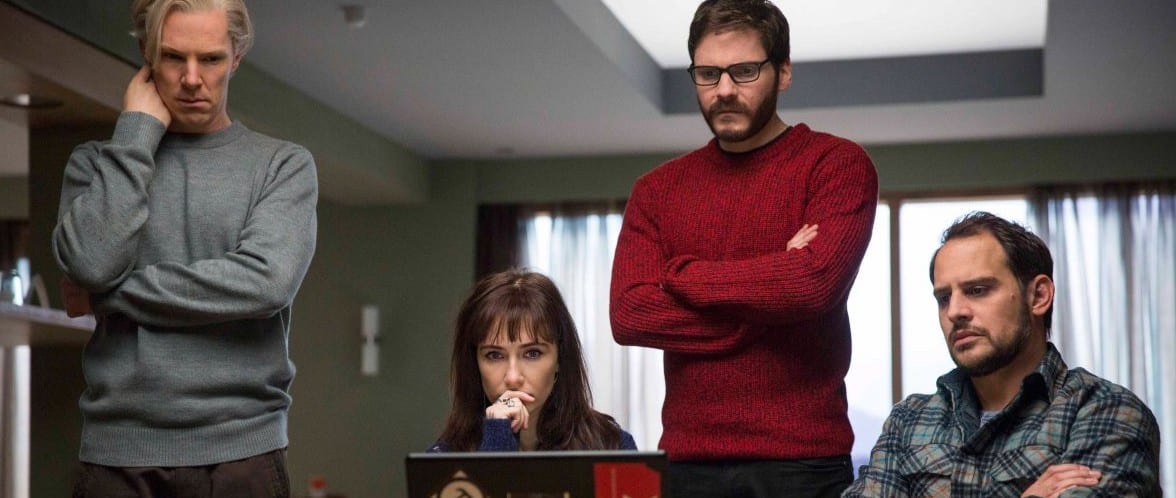 It’s a common maxim that history is written by the winners. But what about the history when there are no clear winners? When something momentous happens- and then nothing really changes at all? And what if we are being asked to write the history we are still living?
It’s a common maxim that history is written by the winners. But what about the history when there are no clear winners? When something momentous happens- and then nothing really changes at all? And what if we are being asked to write the history we are still living?
Directed by: Bill Condon
Written by: Josh Singer
Starring: Benedict Cumberbatch, Daniel Bruhl, David Thewlis
Rated: R
I’d go on but that kind of navel gazing tends to give me a migraine after a while. Suffice it to say that the result is “The Fifth Estate,” a subjective account of Wikileaks and its creator Julian Assange by his erstwhile partner Daniel Berg. The film gained notoriety in the past week by virtue of its not having made as much money as everyone was expecting- which is an interesting turn, considering the movie is partly about Assange’s dogged efforts to make the world populace sit up and take notice of stories that not many people really want to hear.
But “The Fifth Estate” is either also not a story people want to hear, or perhaps just a story the production company didn’t know how to sell. At any rate, I went to the movie with a fever that only a journalism nerd (and lover of Benedict Cumberbatch’s cheekbones) could have, and I walked out thinking, well that was…meh.
To be fair, Cumberbatch, who plays Assange, does indeed have magnificent cheekbones, and is thoroughly compelling to watch with his bone-dry Aussie accent and body that appears to be all limbs (at one hilarious point, Assange is dancing wildly, and a colleague comments that he resembles a blonde octopus.) And Daniel Bruhl, who plays Daniel Berg and was recently seen in the underrated “Rush,” fills his character with nebbishy enthusiasm and provides a great foil for Assange’s glaze of icy pretension. In one terrific exchange, the two are at some sort cyberpunk hacker conference that can only happen in Europe, and Assange rolls his eyes and says “God I hate these people. Aren’t you tired of reading ‘Neuromancer?'” Even someone who knows next to nothing about hacker culture can envision that years of dealing with useless anarchist exuberance could simply drain the life out of you.
But beyond these few snatches of humanity, there isn’t anything particularly revelatory in “The Fifth Estate.” Would anybody be surprised to learn that Assange is a loner, frequently paranoid (sometimes with good reason), and possibly on the autism spectrum? That he can be painfully self-aware, but also incredibly arrogant? That he’s a genius, and like most geniuses (especially in film), he’s also kind of an asshole?
None of this is new territory- and because this is based on a tell-all memoir written by a man with a grudge, we are also put into the hilarious position that we can’t really trust what is in front of us anyway. And so we go round and round during the two hours this movie is on the screen, thinking about Assange, and Wikileaks, which was revolutionary and fierce. You think about the privacy of individuals versus the need of the many, and the trap of moral absolutes. And you think about the fact that Wikileaks, at least in the short term, could not accomplish very much, because people don’t want to hear about morality, and our dark history that is still happening, and civilian deaths in Afghanistan. They want an endless national debate about whether or not Miley Cyrus is a feminist.
Which, you know, is probably why the movie didn’t make all that much money.
And at the end of this two hours, what was it all for? The meta-nature of even this review means I’m about to eat my own tail, and God knows I haven’t learned anything. I don’t think of Assange as a terrorist the way the U.S. Government wants me to. I think of him as I think of this movie: pretty crafty, but a little too satisfied with himself.


Leave a Reply